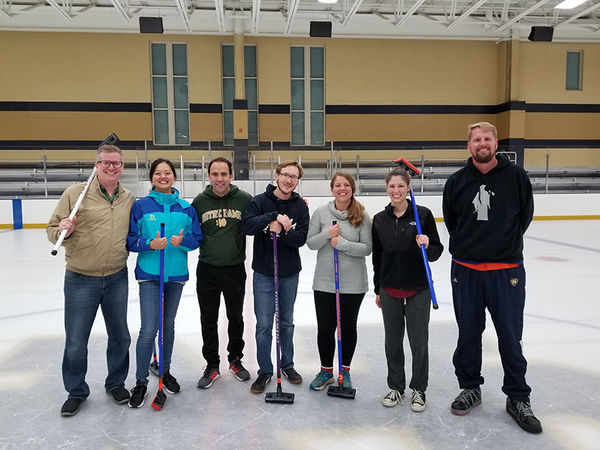
This year, the Graduate School launched a new experiential training program focused on leadership skills and social responsibility. Leaders Advancing Socially Engaged Research, or LASER, is aimed at Notre Dame doctoral students in their 3rd or 4th years of study, and is intended to complement students’ individual research pursuits in their various fields. This year’s cohort consists of seventeen students completing individual LASER projects and hailing from each of the Graduate School’s four academic disciplines (engineering, humanities, social sciences, and science).
The cohort kicked off the year with a cookout in August hosted by John Lubker, the Graduate School’s associate dean for academic affairs, who is spearheading LASER and designing its programming. “I was thrilled to host the inaugural cohort,” Lubker said. “I was very impressed with the passion and energy students are bringing to LASER, even in its earliest stages.” At Lubker’s, the group bonded over team-building activities and catering from J.W. Chen’s. Ensuing gatherings, which take place every three weeks in the Hesburgh Library, have featured topics such as self-awareness, values clarification, crucial conversations, and design thinking. In a few weeks, the group will meet to discuss emotional intelligence.
“These students really embody the Graduate School’s core conviction, Your Research Matters,” Lubker said. “They are challenging themselves to conceive of ways in which their research passions can improve conditions for their communities. As they develop as leaders and socially responsible researchers, I’m looking forward to watching their accomplishments unfold in the next year.”
Below, the 2018-2019 Biological Sciences LASER participants describe their projects in their own words (edited for clarity):
Hannah Corman (Biological Sciences):
As the Social Chair for the Women in Science Conference (WISC 2018) through the Association for Women in Science (AWIS) and the Outreach Chair of the Biology Graduate Student Organization (BGSO), outreach is a strong motivator for my professional development. My goal for my practicum is to encourage young women to pursue their interests in STEM fields and effectively communicate the experiences of women in academia. In my practicum, I will host a workshop for high school women in the South Bend area describing life in graduate school in STEM fields and careers in academia. I aim to have a positive influence on women in the local community and promote their interest in and continuation of STEM education.
Mauna Dasari (Biological Sciences):
My practicum aims to address two major issues associated with the gender gap in STEM fields – retention and upward leadership mobility – through two separate but related mentorship programs. The first program is the Association of Women in Science’s 2018-2019 STEMentorship program. Now in its fourth year, the STEMentorship program pairs undergraduate female STEM majors with female STEM graduate students based on complimentary career goals or experiences, background, and hobbies and facilitates workshops, social events, and a wealth of online resources to support the mentor-mentee relationship. With this iteration of the program, we hope to increase satisfaction with the match system as well as increase attendance at the workshops and social events by better targeting the needs of our participants. The second program is the much newer Women Leaders in STEM (WL-STEM) program. WL-STEM pairs female graduate students and postdoctoral fellows with female postdoctoral fellows, faculty, and staff across the University in a similar fashion to STEMentorship. WL-STEM had a successful pilot semester in Spring 2018, and will be expanded to include more talks and workshops that span the academic year of 2018-2019. By integrating these two complimentary programs, we hope to fortify the support network women in STEM need to not only feel welcome in STEM, but thrive. This practicum will be done in collaboration with LASER fellow Abby Cao.
Casey Stefanski (Biological Sciences)
My project aims to instruct high school students’ about what biological research entails, including laboratory techniques and how these are used in the lab to ask scientific questions. I hope to inspire students to pursue research, while at the same time teaching them common laboratory techniques to ensure their success in the lab. I want to take these students from their textbooks to show them real world application.
Originally published by at graduateschool.nd.edu on October 29, 2018.